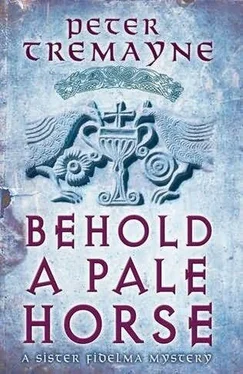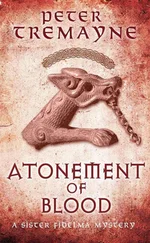Peter Tremayne - Behold a Pale Horse
Здесь есть возможность читать онлайн «Peter Tremayne - Behold a Pale Horse» весь текст электронной книги совершенно бесплатно (целиком полную версию без сокращений). В некоторых случаях можно слушать аудио, скачать через торрент в формате fb2 и присутствует краткое содержание. Год выпуска: 2012, Издательство: St. Martin, Жанр: Исторический детектив, на английском языке. Описание произведения, (предисловие) а так же отзывы посетителей доступны на портале библиотеки ЛибКат.
- Название:Behold a Pale Horse
- Автор:
- Издательство:St. Martin
- Жанр:
- Год:2012
- ISBN:нет данных
- Рейтинг книги:5 / 5. Голосов: 1
-
Избранное:Добавить в избранное
- Отзывы:
-
Ваша оценка:
- 100
- 1
- 2
- 3
- 4
- 5
Behold a Pale Horse: краткое содержание, описание и аннотация
Предлагаем к чтению аннотацию, описание, краткое содержание или предисловие (зависит от того, что написал сам автор книги «Behold a Pale Horse»). Если вы не нашли необходимую информацию о книге — напишите в комментариях, мы постараемся отыскать её.
Behold a Pale Horse — читать онлайн бесплатно полную книгу (весь текст) целиком
Ниже представлен текст книги, разбитый по страницам. Система сохранения места последней прочитанной страницы, позволяет с удобством читать онлайн бесплатно книгу «Behold a Pale Horse», без необходимости каждый раз заново искать на чём Вы остановились. Поставьте закладку, и сможете в любой момент перейти на страницу, на которой закончили чтение.
Интервал:
Закладка:
‘Welcome back, old friend,’ he greeted. ‘I have feared for your safety ever since you set out on your mission on behalf of our scriptorium .’ The abbot spoke in Latin and Fidelma realised that Latin was the language of choice in the abbey. ‘Was your journey blessed with success?’
‘It was, indeed. Our scriptorium now has a copy of the Life of the Blessed Martyr Saturnin .’
The abbot looked quizzically at Fidelma and Magister Ado introduced his companion.
‘Abbot Servillius, this is Fidelma of Hibernia. She has been our travelling companion since Genua.’
‘Fidelma of Hibernia?’ The abbot frowned as if searching his memory. He held out his hand for her to kiss his ring of office as was the custom among the Roman clerics. Fidelma merely took his hand and bowed her head from the neck in accordance with the custom of her own people.
‘She is the daughter of a king of her own land,’ explained Magister Ado.
‘Fidelma?’ mused the abbot. ‘I have heard this name recently … ah! Have you come from Rome?’
‘I have,’ Fidelma affirmed, knowing what was to follow.
‘Ah, I have it now. One of our brethren, coming from Rome, talked of a young religieuse from Hibernia who astonished even the Holy Father by resolving the mystery involving a Saxon archbishop who was murdered in the Lateran Palace itself. Indeed, her name was Fidelma.’
‘She is that very person, Father Abbot,’ affirmed Magister Ado good-naturedly.
Fidelma gave a quick shrug. ‘I played some small part in the resolution of that mystery,’ she admitted.
‘Then you are most welcome here. It is not often we get such distinguished visitors in our lonely valley, although …’ he hesitated and glanced at Magister Ado, ‘although it seems that this week is one for the distinguished and the noble to grace our community. Come.’ The abbot dismissed Brother Wulfila and led them into his study where he indicated that they be seated. It was a small, dark room made darker byoak panels, but there was a small window which cast just enough light for them to see without resorting to lamps.
‘You seem to imply that you have another distinguished visitor under the shelter of your roof, my friend Father Abbot,’ Magister Ado remarked as he sat down.
‘Indeed, we have. Our guest is young Prince Romuald, son of our gracious King Grimoald, who is even now fighting in the south.’
‘Prince Romuald?’ Magister Ado sounded surprised.
As the question needed no response, the abbot turned to Fidelma. ‘And now, Fidelma of Hibernia, you must tell me why you have graced our poor abbey. I presume the obvious answer would be to do with this abbey’s connection with your country?’
It was Magister Ado who answered for Fidelma, speaking quickly before she could. ‘It is Brother Ruadán who brings her hither. He was her mentor and teacher when she was younger and, on hearing that he was in this abbey, she determined to come here and see him before she continued her journey back to Hibernia.’
Abbot Servillius’ pleasant features saddened and he studied Fidelma in sympathy for a moment. ‘A former pupil of dear Brother Ruadán? Then it is God’s will which has guided your footsteps along our valley to this holy place. You have been told of his infirmity? Of course, you must go and see him but, alas, I must warn you that he has deteriorated in recent days.’
‘Can you give any exact details of what happened?’ inquired Fidelma.
‘Very little. He was found outside the gates of the abbey early one morning with a note proclaiming the word “heretic” pinned to him. We know he tried to preach often to thosefollowers of Arius, trying to persuade them to turn from their foolishness. It is thought that he has suffered the consequence of the anger of some of them. Three weeks ago, he returned from Placentia where he had been preaching. He had been assaulted and barely made it safely back. It did not deter him. He left the abbey again to preach in Travo, down the valley. After that he was found outside the abbey gates and grievously hurt. He took to his bed and has not been able to stir from it since. But perhaps the sight of his young friend,’ he motioned towards Fidelma, ‘might revive his spirit. A link with his homeland might act as a tonic, a balm to his soul.’
‘I presume that he is attended by a good physician?’ Fidelma queried.
‘Brother Hnikar is one of the best apothecaries in this valley. He attends him daily. But when the flesh is old and weak …’ The abbot gave a half-shrug, as if to indicate that one could not argue with Fate. ‘I have to point out to you that this is not a mixed community and, therefore, your movements are restricted. It would be best to always have a member of the brethren to guide you.’ He suddenly reached forward and rang a small handbell. Brother Wulfila immediately appeared at the door.
‘This Sister …’ He stopped, shrugged and began again. ‘Take the lady Fidelma of Hibernia to Brother Hnikar. She is to be allowed to see and speak to her compatriot, Brother Ruadán, without restriction.’
The steward hid his obvious surprise by inclining his head to his superior before indicating that Fidelma should precede him through the door.
‘Afterwards, return here and we will discuss accommodation and rules for your stay here,’ the abbot called after her.
The apothecary, to whom she was introduced, was a short, plump man, whose cheeks shone with a childlike pinkness. His eyes were blue to the point of paleness. Fidelma was not sure whether his central baldness was natural or the result of a tonsure. It was surrounded by long silver hair, raggedly cut. He greeted her with a benign expression.
‘You will find poor Brother Ruadán in a sad condition,’ he said, when he was told the purpose of her coming. ‘As you know, the passing of the years can be unkind, and these last days have enfeebled him beyond measure.’
‘His injuries are bad?’
Brother Hnikar’s lips compressed. ‘It is not so much the hurt that was inflicted on him but, at his age, the shock of the violence. I can heal cuts, bruises and wounds, but when the wounds go deep to the mind and soul …’ He shrugged. ‘Be careful what you say to him, for his mind now wanders and he can imagine all manner of things. Come, I will take you to him.’
The room in which Brother Ruadán lay was small but with a large opening that was so placed to let in the sunshine as it descended towards the western mountain ridge. There was little in the room save a cot on which the elderly religieux lay with a straw mattress and a thin woollen blanket. A simple wooden cross was affixed to one wall. A small table with a jug of water and beaker on it and a wooden chest placed for any personal items or clothing made up the rest of the furniture.
Brother Hnikar ushered her inside and whispered, ‘Remember, do not tax the old one. His strength is lessening by the day.’
Fidelma did not reply but moved forward to the bedside.
Brother Ruadán lay as if in complete repose on his back,his hands folded in front of him. His eyes were shut, his breathing somewhat stertorous.
‘Brother Ruadán,’ Fidelma said quietly, resorting to her own language. ‘Can you hear me?’
The regular breathing seemed to hesitate and then the eyelids flickered and opened. The pale eyes stared upwards as if unable to focus on her.
‘Brother Ruadán, can you hear me?’ repeated Fidelma.
‘Who … who speaks?’ gasped the old man in the same language.
‘It is I, Fidelma of Cashel.’
A faint smile seemed to hover on the lips of the old man.
‘Fidelma of Cashel? She is a world away from here.’
Fidelma moved closer and bent over him. ‘Try to focus, Brother Ruadán,’ she said. ‘I am here.’
Читать дальшеИнтервал:
Закладка:
Похожие книги на «Behold a Pale Horse»
Представляем Вашему вниманию похожие книги на «Behold a Pale Horse» списком для выбора. Мы отобрали схожую по названию и смыслу литературу в надежде предоставить читателям больше вариантов отыскать новые, интересные, ещё непрочитанные произведения.
Обсуждение, отзывы о книге «Behold a Pale Horse» и просто собственные мнения читателей. Оставьте ваши комментарии, напишите, что Вы думаете о произведении, его смысле или главных героях. Укажите что конкретно понравилось, а что нет, и почему Вы так считаете.










